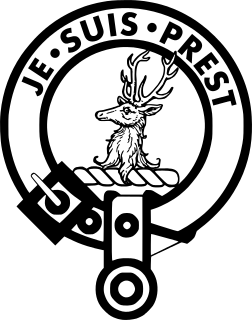Leod is considered the eponymous ancestor and founder of Clan MacLeod and Clan MacLeod of Lewis. Almost nothing is known about him and he does not appear in any contemporary records. Tradition dating to the late 18th century made him a son of Olaf the Black who was King of Man. Heraldic evidence, dating to the late 17th century, is considered to be the earliest evidence of descent from Olaf the Black. However, in recent years, this traditional lineage has been challenged and is no longer considered fact by one historian.

Clan MacNeil, also known in Scotland as Clan Niall, is a highland Scottish clan of Irish origin. According to their early genealogies and some sources they're descended from Eógan mac Néill and Niall of the nine hostages. The clan is particularly associated with the Outer Hebridean island of Barra, The early history of Clan MacNeil is obscure, however despite this the clan claims to descend from the legendary Irish King Niall of the Nine Hostages. The clan itself takes its name from a Niall who lived in the 13th or early 14th century, and who belonged to the same dynastic family of Cowal and Knapdale as the ancestors of the Lamonts, MacEwens of Otter, Maclachlans, and the MacSweens. While the clan is centred in Barra in the Outer Hebrides, there is a branch of the clan in Argyll (McNeill/MacNeill) that some historians have speculated was more senior in line, or possibly even unrelated. However, according to Scots law the current chief of Clan Macneil is the chief of all MacNeil(l)s.

Clan Fraser of Lovat is a Highland Scottish clan. The Clan Fraser of Lovat has been strongly associated with Inverness and the surrounding area since the Clan's founder gained lands there in the 13th century, but Lovat is in fact a junior branch of the Clan Fraser who were based in the Aberdeenshire area. Both the Clan Fraser and the Clan Fraser of Lovat have their own separate clan chiefs who are recognized by the Lord Lyon King of Arms under Scottish law. The Clan Fraser of Lovat in Inverness-shire has historically dominated local politics and been active in every major military conflict involving Scotland. It has also played a considerable role in most major political turmoils. "Fraser" remains the most prominent family name within the Inverness area.

Clan Anderson is a Scottish clan that is recognized as such by the Lord Lyon King of Arms. However, as the clan does not currently have a chief recognized by the Court of the Lord Lyon, it is therefore considered an armigerous clan. Variations of the surname are however considered septs of several other clans of the Scottish Highlands: The surname MacAndrews is considered a sept of the Clan Mackintosh and Clan Chattan, and also associated with the Clan MacDonell of Glengarry. The surnames Andrew and Andrews are considered septs of the Clan Ross.

Clan Logan is a Scottish clan. Two distinct branches of Clan Logan exist: the Highland branch; and the Lowland branch. The clan does not have a chief recognised by Lord Lyon King of Arms, and therefore can be considered an armigerous clan. Today, some regard Clan MacLennan as a variant of the Highland Logan clan.

Clan Arthur or Clan MacArthur, is a highland Scottish clan that once held lands on the shores of Loch Awe opposite Inishail. The clan has been described as one of the oldest clans in Argyll. Clan Arthur and Clan Campbell share a common origin, and at one point the MacArthurs challenged the seniority of the leading Campbell family. A branch of MacArthurs from the Isle of Skye were a sept of the MacDonalds of Sleat, and were hereditary pipers for the MacDonalds of the Isles. In late 18th century the chief of the clan died without an heir, leaving the clan leaderless until the late 20th century. In 2002, the first chief of Clan Arthur was recognised in about 230 years.

Clan Jardine is a Lowland Scottish clan.

Clan Macfie is a Highlands Scottish Clan.

Clan Boswell is a Lowland Scottish clan and is recognized as such by the Lord Lyon King of Arms. However the clan does not currently have a chief and is therefore considered an Armigerous clan.

Clan MacAulay, also spelt Macaulay or Macauley is a Scottish clan. The clan was historically centred on the lands of Ardincaple, which are today consumed by the little village of Rhu and burgh of Helensburgh in Argyll and Bute. The MacAulays of Ardincaple were located mainly in the traditional county of Dunbartonshire, which straddles the "Highland Line" between the Scottish Highlands and Lowlands. Clan MacAulay has been considered a "Highland clan" by writers and has been linked by various historians to the original Earls of Lennox and in later times to Clan Gregor. The MacAulays of Ardincaple, like Clan Gregor and several other clans, have traditionally been considered one of the seven clans which make up Siol Alpin. This group of clans were said to have claimed descent from Cináed mac Ailpín, King of the Picts, from whom later kings of Scotland traced their descent. The chiefs of Clan MacAulay were styled Laird of Ardincaple.

Clan Galbraith is a Scottish clan. The clan does not have a chief recognised by the Lord Lyon King of Arms. Because of this, the clan is considered an armigerous clan, and as such Clan Galbraith has no standing under Scots Law. The clan-name of Galbraith is of Gaelic origin, however its meaning denotes the bearer as of British origin, as opposed to Gaelic. The early Galbraiths were centred in the Lennox district, which spans the Highland and Lowland border of Scotland. The 17th chief of the clan brought ruin to the clan in the late 16th and early 17th century, and eventually lost his lands and fled Scotland for Ireland. His grandson, the 19th chief, was the last chief of Clan Galbraith.

A Scottish crest badge is a heraldic badge worn to show allegiance to an individual or membership in a specific Scottish clan. Crest badges are commonly called clan crests, but this is a misnomer; there is no such thing as a collective clan crest, just as there is no such thing as a clan coat of arms.

Clan McCorquodale is a Scottish clan, recognised by the Lord Lyon King of Arms, though without a chief so recognised. The last chief of the clan died in the 18th century. Because the clan does not have a recognised chief, it is considered an armigerous clan, and has no legal standing under Scots Law. Historically, the clan inhabited lands west of Loch Awe, in Argyll. These clan lands were centred at Loch Tromlee, where an island castle served as the clan seat. The line of Clan McCorquodale chiefs, first recorded in the 15th century, has been untraced since the 18th century.

Clan Ged is a Scottish clan. The clan does not currently have a chief recognised by the Lord Lyon King of Arms and is considered an armigerous clan. Without a recognised chief the clan has no standing under Scots Law. In Scotland, the surname Ged and Geddes may be derived from the place-name Geddes in Nairn. Another possibility is that it is derived from the Old English gedda, a nickname meaning pike.

Clan Kinninmont is a Scottish clan. The clan does not have a chief recognised by the Lord Lyon King of Arms, therefore the clan has no standing under Scots Law. Clan Kinninmont is considered an armigerous clan, meaning that it is considered to have had at one time a chief who possessed the chiefly arms, however no one at present is in possession of such arms. The original chiefly line died out when an heiress married into another family.

Clan Cairns is a Scottish clan. The clan does not have a chief recognised by the Lord Lyon King of Arms, therefore the clan has no standing under Scots Law. Clan Cairns is considered an armigerous clan, meaning that it is considered to have had at one time a chief who possessed the chiefly arms, however no one at present is in possession of such arms. The arms of Cairns of that Ilk are blazoned as: Gules, three merlette Or.

Clan Walkinshaw is a Scottish clan. It does not have a chief recognised by the Lord Lyon King of Arms therefore the clan has no standing under Scots Law. Clan Walkinshaw is considered an armigerous clan, meaning that it is considered to have had at one time a chief who possessed the chiefly arms, however no one at present is in possession of such arms.

Clan Maxton is a Scottish clan. The clan does not have a chief recognised by the Lord Lyon King of Arms therefore the clan has no standing under Scots Law.

Clan Bissett is a Scottish clan. The clan is recognised by the Lord Lyon King of Arms but does not have a clan chief recognised by the Lord Lyon King of Arms, therefore the clan has no standing under Scots Law. Clan Bissett is considered an armigerous clan, meaning that it is considered to have had at one time a chief who possessed the chiefly arms; however, no one at present is in possession of such arms. The surname Bissett is also considered a sept of the Clan Fraser of Lovat.
Scottish surnames are surnames currently found in Scotland, or surnames that have a historical connection with the country.


















